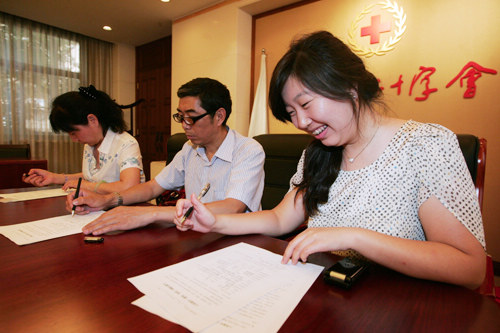|
 |
|
PASSING THE GIFT OF LIFE: A family of three sign documents to become deceased organ donors at the Red Cross Society of Zhejiang Province on May 20, 2011. Wang Liangjun (center) recovered from cirrhosis after receiving a liver transplant (WU HUANG) |
Experts suggest that the compensation amount should be set according to the financial need of the family and not based on how many organs a donor has donated, to avoid money-driven donation. A national regulation on managing an organ donors' aid fund is reportedly at its drafting stage.
China's future national cadaver organ donation system, which has taken shape in the 16 provincial-level regions that participate in the pilot program, will be composed of eight databases that are still being fine-tuned by the Ministry of Health.
When the system is set in place nationwide, after an organ donor dies, all the donated organs will be registered in a database to prevent sales. Their availability and testing information will be immediately uploaded to a national network for organ sharing, which can be accessed by transplant surgeons from all qualified hospitals. Doctors of patients on the waiting list will be informed of the availability of organs through a cell phone text message.
Information of all organ transplant surgeries will also be put in a data pool. Therefore, when a patient with an illegally transplanted organ visits a hospital for post-transplant check-ups, doctors can confirm the nature of the transplant and report the case to health authorities through another system. Then health authorities can investigate the source of the organs and punish medical facilities that conduct illegal surgeries.
Through the two-year pilot program, a breakthrough has been made on making organ allocation more transparent.
The organ allocation network on trial has prioritized the urgency of patients' conditions and geographic proximity in a unified national waiting list. Under the trial system, when a donor dies in a hospital, patients hospitalized in the same facility will be first considered as recipients. If there is more than one candidate, the sickest patient will get the organ. When there is no candidate, the recipient search will be expanded to medical facilities in the same city, and then in the same province and finally around the country. Last year, a donated liver harvested in a hospital in Guangzhou, Guangdong Province, traveled more than 2,000 km to save a person's life in north China's Tianjin, which was impossible before the adoption of the national sharing platform.
Designers of the organ sharing network argue that the proximity-based rules ensure that organs spend the shortest possible period of time out of a body, which guarantee the highest success rate for the transplant. The only exception is when the donor's close relatives need an organ, in which case they will be granted priority.
Li Peng is a surgeon at a hospital in Guangzhou. He said that without the ground-breaking national organ sharing network, medical facilities used to compile their own waiting lists according to different criteria. While some prioritized patients with the longest waiting time, others thought the survival rate was the most important gauge.
An anonymous surgeon told the The Beijing News that in the past with no clear system, donated organs were often handed out to those with professional connections to the harvesting surgeon. It was also reported that some doctors would favor their acquaintances or even patients who were willing to bribe them.
"Only when the organ allocation is fair, will more people be willing to become donors," Li said.
During the two-year pilot program, an unexpected hindrance to the organ donor enlistment has come from hospitals and clinics, which are reluctant to turn off life-sustaining equipment for fear of litigation from families.
The Beijing News reported a case in a province covered by the pilot program where family members of a brain-dead patient had agreed to donate the person's organs when the president of the hospital opposed removing life support for fear of malpractice litigation. Eventually, the family had to give up their altruistic act. An anonymous organ donation coordinator who worked on this case blamed the lack of public awareness of organ donation for the hospital's fear.
Hao said that many hospitals don't want to get involved in organ donation at all due to legal risks.
In countries like the Netherlands, education programs enabling teenagers to make an informed decision about organ donation have proved effective in increasing the number of potential donors. In China, such programs have yet to be conducted.
A recent survey conducted by the Red Cross Society of China on 1,000 people in 12 provincial-level regions revealed that 72.4 percent respondents expressed their willingness to become organ donors after knowing that their bodies can save lives. About 70 percent of those who support organ donation were teenagers and young adults.
"It is a surprise for us to know that there are so many people supporting this cause out there," Hao said.
Email us at: lili@bjreview.com | 